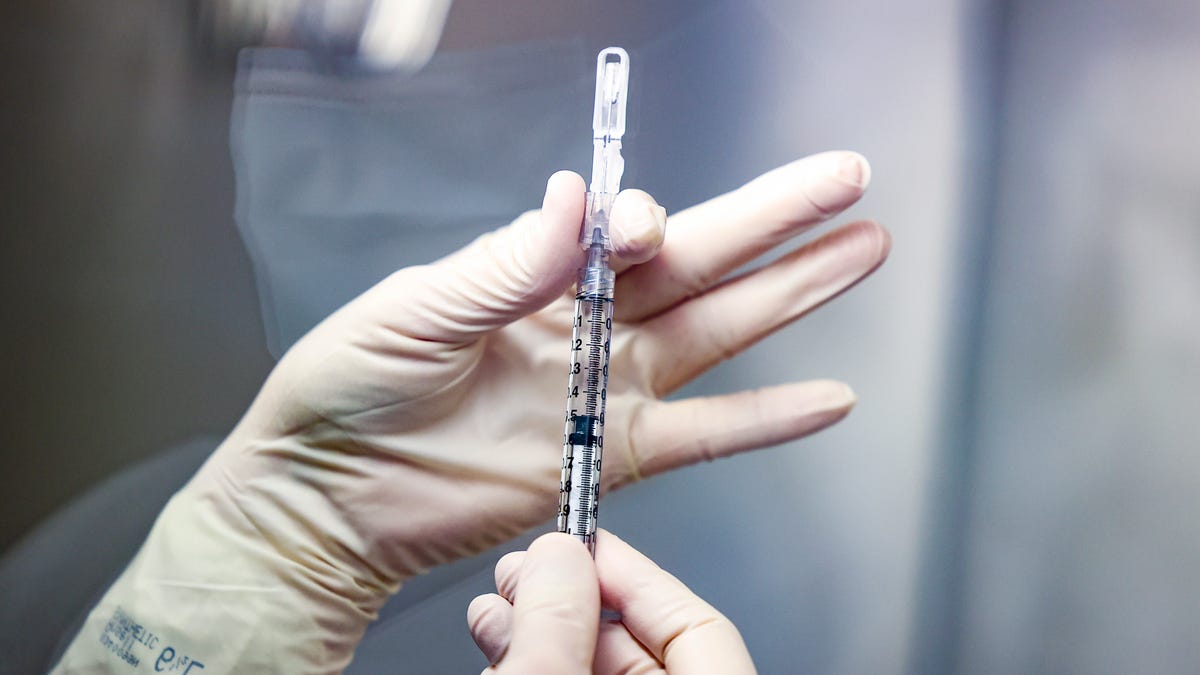New COVID Shots Are Available Now: Here's How to Find One
Here's what to know about the new vaccine formulas, who can get a booster and how they'll continue to be free.

As of last week, everyone age 6 months and older can get a new shot for COVID-19 this fall and winter season, according to the US Centers for Disease Control and Prevention. New formulas from Pfizer and Moderna have been updated to target a newer version of the omicron variant that's more closely related to current versions of the virus.
Prior to the CDC's recommendation, its advisory committee voted for a wide-reaching vaccine campaign this fall, as opposed to recommendations for just older adults and those with certain health conditions.
One important change from last year is that COVID-19 vaccines are no longer purchased by and completely paid for by the federal government. Instead, private and public insurance, as well as programs for uninsured people, should keep them free for everyone.
The online vaccine-finder tool is now up and running, and you can use it to find a vaccine of your choice as well as pharmacy locations that are offering shots for people without insurance through the Bridge Access program.
While the current burden of COVID-19, including hospitalizations, is considerably lower than it was during the height of the pandemic, there has been a late-summer rise in hospitalizations and deaths. Like other viruses, we can expect COVID-19 infection rates to rise during the fall and winter months when more people are spending time indoors. This will also be the first season an RSV vaccine is available for some adults, along with a new treatment for infants.
The US Food and Drug Administration earlier this year announced a plan to make COVID-19 vaccines look more like annual flu shots, which are updated each year to be the best match for the circulating virus.
Here's everything we know about the new shots.
What are the new COVID shots?
Moderna and Pfizer updated their vaccine formulas to target a newer strain of omicron, XBB.1.5. They're both "monovalent" vaccines, which means they're formulated to go after one strain of the virus, compared to the "bivalent" vaccines that rolled out last fall and targeted both the original COVID-19 virus plus another, older version of omicron.
They were fully approved by the FDA for adults and older kids, and given emergency use authorization for children age 6 months through 11 years.
It's possible or even likely a third vaccine will be added to the choice pool this fall and winter season: a shot from Novavax is currently under review by the FDA.
Who can get a shot now? When should I get it?
Adults and kids 5 years and older can get a single updated shot, as long as it's been at least two months since your last vaccine dose, per the FDA's rules on the new formulas. For younger children age 6 months through 4 years, the FDA says the timing and number of doses will depend on any previous COVID-19 vaccine they received.
Much of the discussion from the CDC's committee (called the Advisory Committee on Immunization Practices) was about whether to make a universal recommendation and open up access to more people, or whether to focus the recommendation on people who are at much higher risk of severe disease and death, which includes older adults and people with certain underlying health conditions.
People who are immunocompromised may have slightly different or additional recommendations by their doctor, but specifics from the CDC still aren't clear.
Will I have to pay for the COVID vaccine?
One major difference with the booster this time around, now that COVID-19 is no longer considered a public health emergency, is that COVID vaccines aren't being purchased by the government. However, the cost of your shot should still be covered either through insurance (private or public) or through a public program.
Insurance plans are expected to cover COVID-19 vaccine costs immediately, according to a presentation last week from Dr. Georgina Peacock, director of the Immunization Services Division in the National Center for Immunization and Respiratory Diseases at the CDC. People who have Medicare or Medicaid should also have the cost of their vaccine covered. Children who are underinsured should also automatically be covered by the Vaccines for Children program, which covers vaccines that are recommended by ACIP.
For adults who are uninsured or underinsured, the CDC has something called the Bridge Access Program that will allow adults to get shots for free at participating pharmacies, including Walgreens and CVS locations, as well as local health clinics. This program will expire at the end of December this year, but a longer-term solution similar to the Vaccines for Children program is in the works.
To find a participating pharmacy and get a free shot if you're uninsured:
- Use the vaccine finder at Vaccines.gov.
- Click the blue "Find COVID-19 vaccines" button.
- Enter your ZIP code and select which vaccine you're looking for (adult; Pfizer vs. Moderna, etc.) and click "Search."
- Under "Only show locations with," click "Participating in Bridge Access Program." From there, choose your location and book your appointment.
Note that the rollout is still relatively new, so more locations may be added in the coming days.
Other Wellness Guides
Personal Care
Sleep
Fitness
Nutrition
Medical and Mental Health

